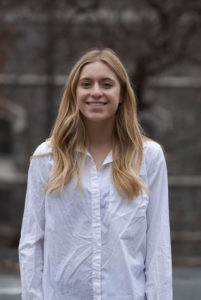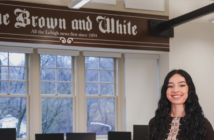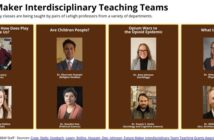
Kayla Arestivo
I remember my first day of orientation at Lehigh University.
My group took part in activities, meetings and constant icebreakers to get to know our new peers. We sat around tables and introduced ourselves with our names, where we’re from and our majors.
Each of my new classmates listed their desired majors with confidence. “I am a finance major,” they would say. “I want to be a bioengineer” — they knew exactly what they wanted to do with their futures before they even had their first college class.
I always settled on “undecided” when it came time to announce my major.
Is this how it should be?
Is this what’s expected?
My presumption was that the purpose of a liberal arts education was to learn about yourself, your likes and dislikes — to cultivate the person you want to grow into.
This presumption stands as my belief.
A study credited to The Mentor: An Academic Advising Journal shows that the brain of a first-year college student is not developed enough to make a decision that impacts the rest of their lives. Their decisions should be based on self-reflection and identity.
The study shows that students at this developmental stage aren’t yet prepared to choose a career path and that the reality of doing so is fundamentally leading them to make uninformed decisions.
“The study ultimately implied that students are choosing a major based on influence and assumption rather than through an understanding of their own personal goals and values,” said Liz Freedman of Butler University. “The choice of major can have a significant positive or negative effect on the student experience, affecting retention, engagement, student learning, academic standing, setting of academic and career goals, and more.”
My first semester, I took a freshman seminar class called “What am I doing here: The value of a liberal arts education,” with professor Amardeep Singh.
This class helped me understand that many first-year college students have not made a decision yet. It helped me realize that it can be advantageous for me, in the long run, to wait until I have found a subject and major that I am passionate about.
Singh thinks it’s important for students to take their time and to use the resources provided by the university before choosing what they want to do. He would urge students to think imaginatively and creatively about their decisions instead of automatically choosing what seems practical.
For a lot of students, even my own peers, college is a means that gets you to your future. The belief among the majority of my age group is the faster you choose a major, the faster you get on the right path to a career.
This might be the case, but college should be more than just a gateway to getting a job. This is our future we’re talking about.
“Students that feel inspired, passionate and energized about what they’re doing are going to have an advantage down the road,” Singh said.
And that is what he aims to teach first-years in his seminar.
He believes rushing into a decision could lead students into making less fulfilling and intellectually stimulating choices. It is the role of faculty and professors to make sure students think broadly about the choices they make.
I think his thoughts and advice are exactly what students need to make an informed decision with careful consideration.
An article written by Abigail Lane for The Guardian said students are making hurried decisions to get good grades to qualify for jobs they may not even want in four years.
The pressure for 18-year-olds to follow the norm and pick a career path that is going to suit them for the majority of their future is overwhelming.
Lane adds that not only can it be detrimental for the student to be stuck in a career that they have no interest in, but it’s also detrimental to their future employers, who could potentially be hiring someone who will soon leave the field.
Students have the necessary guidance and support, but what we really need is to give ourselves the time to explore opportunities we may not have thought to be feasible or practical.
Sitting in that orientation room in the beginning of my freshman year, I never would have thought I would be majoring in journalism and pursuing a career in public relations and communications.
With that, I found faculty I look up to, classes that interest me and a field I am passionate about.
All it took was one decision and the time to try something new.
– –
Kayla Arestivo, ’20, is an assistant sports editor for The Brown and White. She can be reached at [email protected].





Comment policy
Comments posted to The Brown and White website are reviewed by a moderator before being approved. Incendiary speech or harassing language, including comments targeted at individuals, may be deemed unacceptable and not published. Spam and other soliciting will also be declined.
The Brown and White also reserves the right to not publish entirely anonymous comments.
1 Comment
Excellent article. I really appreciate the way you have explained the things in your post. Keep posting.